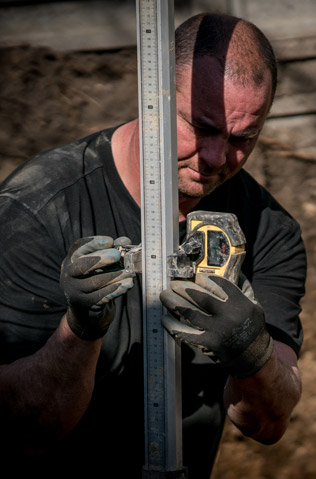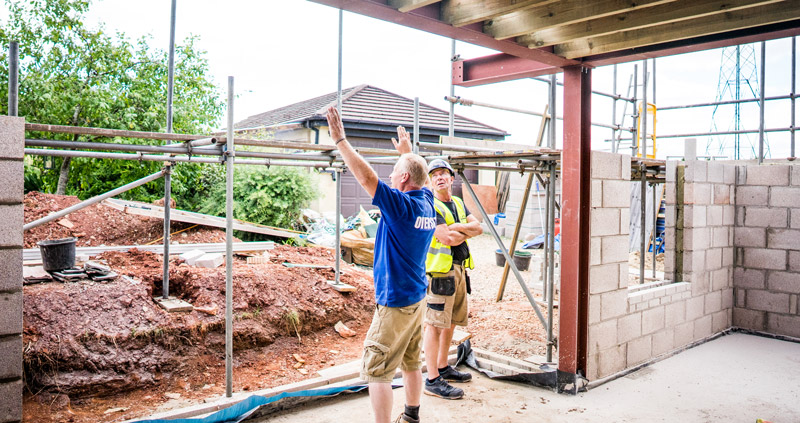Choosing the right groundworker
Reading time: 7 minutes
When choosing the rightgroundwork and foundations specialist, there are some key issues you need to think about. In this article, we’ll take you through them step by step.
- Arm yourself with some basic knowledge first
- Ask a few key questions to gauge experience
- Get a detailed quote from each tradesperson you’re considering
- Choose a tradesperson who encourages your involvement
- Ask who will actually be doing the work
让我们更深入地了解每一个选项。
Arm yourself with some basic knowledge first
Groundwork and foundations can be a somewhat mysterious trade; a lot of homeowners aren’t sure what it actually involves, and it’s therefore particularly tricky to work out if a specialist is giving you the correct information or undertaking a project in the right way.
In simple terms, agroundworker准备新家或扩建的地点。他们通常清理地面,铺设地基,安装排水系统,并与现有的管道连接。建筑完成后,他们也可能回来增加铺路,人行道,景观美化和车道。
When you’re hiring tradesperson to work on this sort of project, it’s a good idea to do a bit of your own research first, so you have a basic understanding of the main issues and know which are the key questions to ask.
首先,与制定你的计划的建筑师交谈,并询问他们是否有任何不同寻常的问题,你可能会面临现场。你可以在与商人的初次交谈中提出这些问题,并询问每个专家打算如何处理这些问题。
Matthew Lyttle ofMRL Construction & Maintenancespecialises in drainage, footings and hard landscaping and has a spotless, 100% positive feedback rating on MyBuilder. He recommends doing a bit of reading around the subject, too:
There’s a book called the Building Construction Handbook, by Roy Chudley and Robert Greeno. It's a great guide to all aspects of building, big or small. And because it doesn’t use too much jargon it’s pretty easy for non-experts to understand. I recommend it to quite a few customers.

Ask a few key questions to gauge experience
Get at least three groundwork and foundations specialists to visit the site and quote on your project. Choose a tradesperson who has plenty of experience of doing similar jobs to yours - for example, on similar types and sizes of buildings, and to a similar timescale.
As well as checking their MyBuilder feedback, ask to see photographs of previous jobs - and also see if you can speak to one or two of their previous customers. A reputable tradesperson should be happy to put you in touch with past clients, and this will give you the chance to find out what a tradesperson is like to work with on a day-to-day basis. For example, are they polite and punctual? How did they deal with unexpected snags? And were they easy to contact after the project had finished, if the customer had any further questions?
When judging a groundwork specialist’s experience and competence, there are a few key questions that they should be able to answer.
Matthew highlights two key topics to raise. The first is ground heave - the upward movement of the ground which can occur when clay soils get wet and expand:
The main issue with footings is always going to be ground heave. The drawing your architect does for you should flag up if there is any risk of heave - and if there is, a tradesperson would need to use Claymaster - a product that protects against ground heave - on the inside of the footings. If you ask a tradesperson about ground heave and they don’t know what you’re on about, they’re not experienced enough!
The testing of drainage is also crucial. If they say they’re just going to chuck a bucket of water down the hole they’ve dug, that’s another fail. As well as a flow test (pouring water down the hole) the test building regulations will generally want you to do an air test. That’s where you close all the pipes off, blow air into the system and put a new gauge on it - to see if any air leaks from the system.
There’s also a seal test, where you fill the system with water, seal it off, and then see if any water seeps out. If a tradesperson doesn’t mention either of these last two tests when you ask how he plans to check drainage, be wary.
Get a free quote
We can help you meet professional groundwork and foundations specialists near you to get real quotes today.

Get a detailed quote from each tradesperson you’re considering
Each tradesperson should provide you with a free, detailed written quote. This should break down and highlight all the costs you may potentially incur, from labour and materials to the removal of waste from the site.
As Matthew explains, different groundwork and foundations specialists charge for projects in different ways. Some, like Matthew, give customers a couple of different options:
I explain to customers that they can either pay on a day rate, or I can give them an all-inclusive quote. Some people will only offer an all-inclusive quote - but the trouble is that until you dig the footing, and the building inspector passes it, you don’t necessarily know how deep it’s going to be.
例如,一个建筑师的图纸可能表明它应该是1米深,然后建筑检查员会说它需要是1.2米深。这显然会增加额外的混凝土成本。这意味着如果你只得到一个报价的全部成本,建设者很可能报价了最坏的情况。当你不需要的时候,你可能会为它付很多钱。
Whereas I give the customer the option of paying for the concrete once it’s been inspected by the building inspector; that way they’re not paying for concrete they’re not using. The labour cost stays the same - I give them a fixed labour cost and I don’t charge any more for that - so it often works out cheaper overall.

Whichever system of payment you choose to go for, never pay in full for a building project until the work has been completed, you’ve inspected it and are completely satisfied with the work.
Choose a tradesperson who encourages your involvement
Ask each tradesperson you’re considering how they would feel about you being present when the building inspector comes. A good tradesperson should have no issue with you being involved at this stage, as Matthew points out:
I would really encourage homeowners to be on site at this point. That means they’re able to hear all the feedback from the building inspector - he’s the referee for both you and the tradesperson, and the guarantor that everything’s being done right.
It should also serve to reassure the homeowner; they’re not just taking the tradesperson's word about what the building inspector has said.
Ask who will actually be doing the work
Ask the tradesperson who comes to quote on your project who will actually be doing the work. Will he be ultimately responsible for the project, heading up a team of permanent employees? Or will he be subcontracting the work out?
Many good groundwork and foundation specialists subcontract out certain tasks - this is not necessarily a problem. But as Matthew emphasises, it’s important you find out the extent to which work will be outsourced - and crucially, who will be taking responsibility if there are any issues:
On any site where footings or drainage is involved, I always make sure I deal directly with the customer. The only sub-contractors I use are bricklayers, and even then I use the same team every time. I also try to give the homeowner an update at the end of each day, to keep them in the loop.
I offer a guarantee on all my work - that it’s guaranteed to pass by the buildings inspector. And I also tell every homeowner to get in touch with me if there are any issues, and we’ll come and rectify them.




